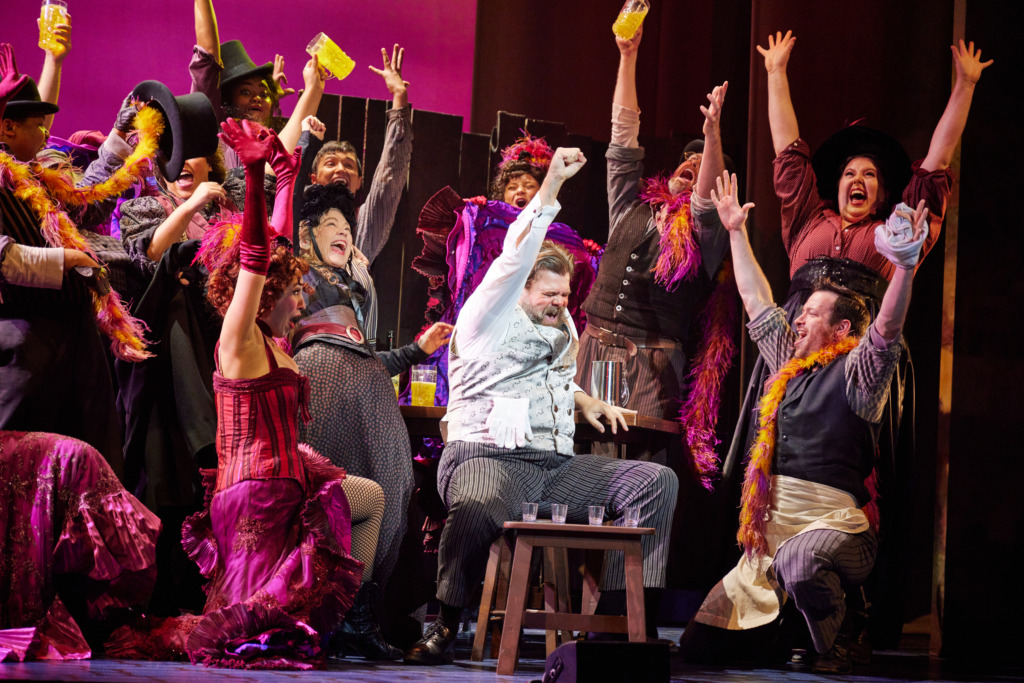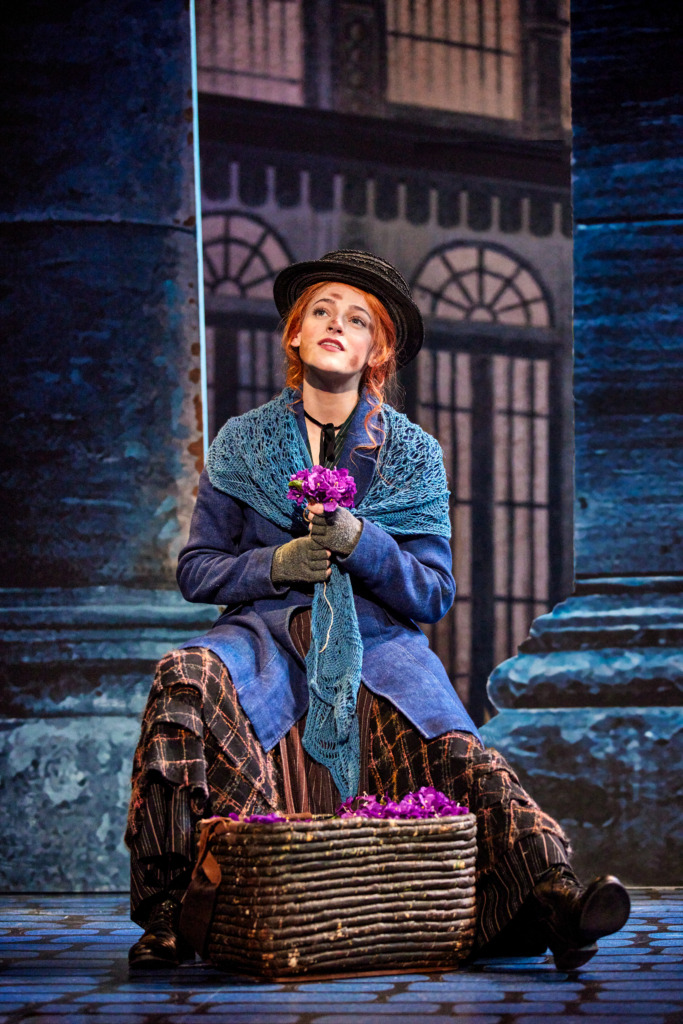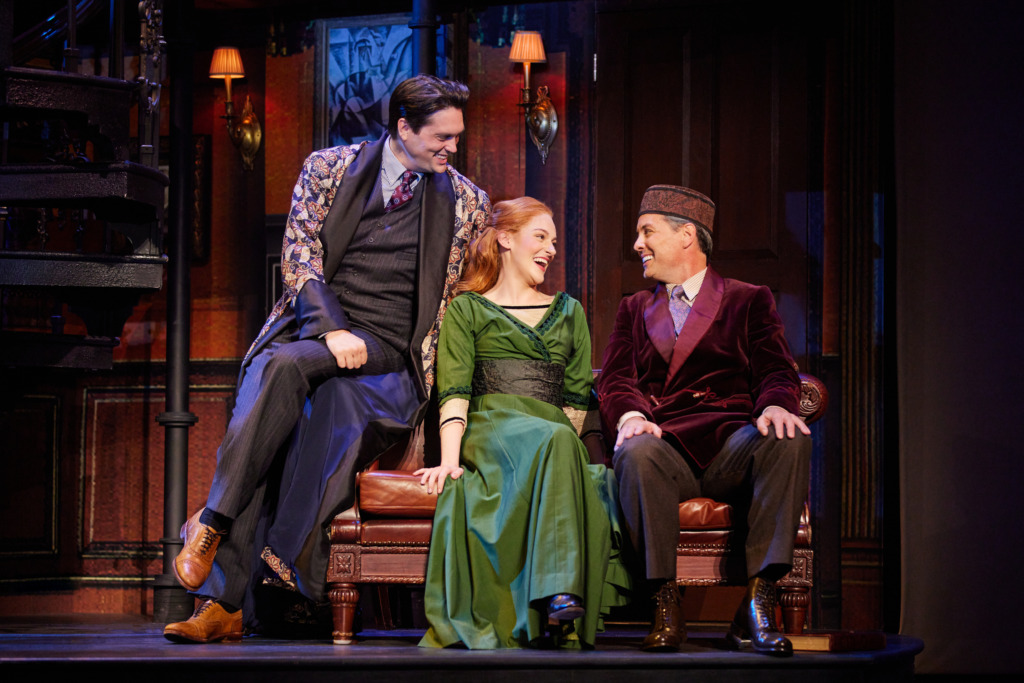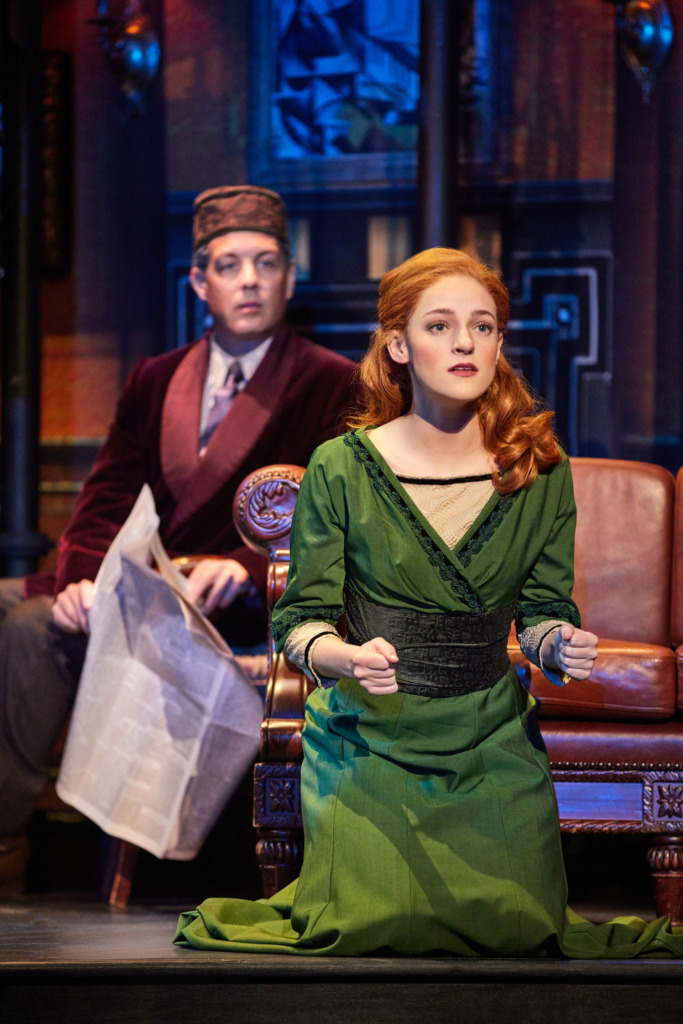The Alan Jay Lerner/Frederick Loewe classic My Fair Lady rolled their second leg of the post-Covid national tour into the National Theatre in DC. Originally conceived for Lincoln Center under the masterful eye of Bartlett Sher, the most accomplished director in the business for breathing new air and contemporary relevancy into beloved but dated musicals. Having had great success with such classics as The King & I, South Pacific, Fiddler on the Roof, and this season’s highly-anticipated revival of Lerner & Loewe’s second major hit, Camelot, this Broadway 2018-19 season’s entry met with less glowing reviews than his previous accomplishments.

Let’s first address the elephant in the room. My Fair Lady, based on George Bernard Shaw’s 1913 classic Pygmalion, tells the story of a London based, renowned linguistics professor who makes a wager with a fellow respected doctor of dialect that he can pluck a low-class Cockney flower girl from the streets of Covent Gardens and, under his masterful tutelage, mold her mangled English and common manners into a package he can pass off as a lady in real society. Today’s woke brigade has branded the show “a product of its time”, misogynistic and needing to be “canceled”. Let me make it very clear to those with such a limited view: There are stories that have characters who display bad behavior. Showing bad behavior is not condoning it. It is exhausting having to defend classic literature to the social warriors of this generation every time a “product of its time” resurfaces. Carousel does not promote domestic violence. How to Succeed in Business is not a testament to sexism in the workplace. South Pacific doesn’t endorse racism. Likewise, My Fair Lady (and its source material) is not an out-of-date work to be retired for its sexist views. Like any good art, these shows were decades ahead of their time, showing us dismal behavior to make their audiences think and initiate discussions on the topics—which is ironically happening today but backfiring. They portray the behaviors, some in comedy, some in tragedy, to show they are wrong and initiate change. Of course My Fair Lady features abhorrent misogynistic attitudes from its protagonist. That was Shaw’s intention over a century ago—to write a social commentary on turn of that century sexist ideals and mentality to raise awareness and stimulate growth and change. It is an absolute shame that 50-100+ years later, more enlightened and aware audiences can no longer take away anything more than the most surface interpretation of the material that is intended to promote the discussions we should be having about these issues, without accusing the authors of endorsing the actions. One last time for the militants in the second balcony—bad characters can behave badly to show how detrimental that behavior is and educate to ignite change. It’s just apparently so much easier and more fun for the keyboard activists to get on their individual social media talk show and shout their most shallow interpretations to show the world they have no true understanding of parody, irony, character flaws, or good storytelling in general, and should resist the urge to be desktop critics, talking without thinking. It’s sad that audiences can embrace a modern satire like American Psycho without raging that it promotes mass murder. But their parents’ and grandparents’ movies, plays, and books, they’re just sad leftovers of their less-enlightened time. It’s a good lesson in humility—and art appreciation—to understand that in most instances, the grand masters of literature, cinema, and drama were infinitely deeper, smarter, and more progressive than today’s audiences can imagine ever giving them credit for. In most cases, more socially adept than their modern critics.

Rant over. On to the production at hand. It is probably a backhanded compliment to say that Sher has effectively accomplished his goal of exposing the roots of misogyny, ultimately deflating it. He doesn’t shy away from Henry Higgins’ dismal behavior, or Eliza’s toleration of it (to a point). Seeing the dare as a means to improve herself and earn passage into better circles and better income, she willingly subjects herself to his ultimately demeaning challenge. That’s not capitulating, that’s good business sense—from a woman at that.
As Eliza Doolittle, Madeline Powell is a strong central character, and not just a cipher for the men to do with as they wish. She has a strong voice, albeit pretty but a bit thin in her upper register (partial blame may belong to the antiquated sound system at the National). But what she lacks in predecessor Julie Andrews’ vocal power, she makes up for as an unexpectedly strong comic actress. Sher directs her as a strong nemesis for Higgins, and she embraces every bit he throws at her, most notably a humorous re-envisioned “I Could Have Danced All Night” which becomes a battle between Eliza with a second wind following her breakthrough in a triumphant “The Rain in Spain”, hungry for more knowledge, and the sleep-deprived staff trying to wrestle the linguistics book from her eager hands and get her into bed. Her Eliza is not a victim of Higgins verbal and emotional abuse, she stands up to him and fights back. And Powell displays her serious acting skills in the second act when she returns triumphant from the Embassy Ball and receives zero credit for the work she put into the transformation. She becomes stronger and more independent as an Eliza of a more post-feminist age. Her final showdown with Higgins at his mother’s estate escalates with increasing intensity until she blasts him with an unusually strong-willed “Without You”, almost as if it were that period’s “I Am Woman”.
Jonathan Grunhart as Henry Higgins is abrupt, arrogant, and almost devoid of humanity in his detached approach to Eliza. He deliciously spouts off comically cruel “observations” about his subject as if he were housetraining a street mutt. A strong comedian, his brittle and heartless line delivery, reminiscent of David Hyde Pierce as the self-absorbed Dr. Niles Crane, is so self-inflated and bombastic that it assists the goal of not taking his derogatory attitude seriously, and clearly seeing that his sexist philosophies are wrong and need addressing (see how the creators beat you to that critique?). He is even saddled with two numbers devoted to his “confirmed bachelorhood”, “I’m an Ordinary Man” in the first act, which addresses the destruction leveled upon a man’s peaceful existence when he allows a woman into his life, and his second act “A Hymn to Him”, which asks the musical question, “Why can’t a woman be more like a man?” Sexist themes? Absolutely yes to both, but neither leaves Higgins looking particularly good in the end, as designed. Grunhart’s most significant contribution is that he actually sings the bulk of Loewe’s melody lines for all his songs, unlike the tradition of speak-singing them as Rex Harrison established in the original stage and screen productions as the norm. There are some delightful melodies we’ve never heard except in the underscore going on there, and Grunhart is in fine baritone voice delivering them. Sher also smartly scores with Grunhart being significantly younger and more attractive than the role is usually cast. It makes the forced-in attraction that Shaw never wanted between Higgins and Eliza (but “musicals have to have a love story”) make sense, instead of having her fall in love with a relatively creepy, abusive, older man. We certainly understand three scenes in how Eliza would have some daddy issues but with a less significant age difference, if we must have a love story, it works. (This is perhaps one of the reasons Shaw refused to ever release the rights to turn Pygmalion into a musical; Lerner & Loewe had to wait till both he and Gabriel Pascal who owned the movie rights, had both passed to secure them).

Which brings us to the reason for Eliza’s said daddy issues. Michael Hegarty provides hilarious comic relief as Alfred P. Doolittle, Eliza’s good-for-nothing, pub-haunting, free-loading father, popping up every few scenes to both bring laughs and further understanding why Eliza puts up with Higgins nonsense to escape the life she led. Granted the two biggest production numbers in the show, “With a Little Bit of Luck” in the first act and the second act showstopper “Get Me to the Church on Time”, Hegarty is a refreshing break from the perpetual battle of the sexes between Higgins and Eliza.
As Col. Pickering, Higgin’s peer who accepts his wager and assists his efforts, John Adkison is a welcome dose of sympathy and compassion for Eliza to balance Higgins’ brashness. It’s somewhat jarring that, despite soft spot for Eliza, he is the instigator behind giving Higgins all the credit for her hard work in “You Did It”, which is the last straw for Eliza’s patience.
In smaller roles, Becky Saunders as Higgins’ mother who sees him for all his flaws and Madeline Brennan as Higgins’ no-nonsense housekeeper Mrs. Pierce both excel with comic quips to keep Higgins as grounded as he can be.
Nathan Haltiwanger as suitor Freddy Einsford-Hill, the socialite who is completely enamored with Eliza’s candid charm, a refreshing change from his stuffy society acquaintances, is a delight in an expanded cameo role graced with one of Loewe’s finest melodies, singing Eliza’s praises as he dotes outside her door for days on end, “On the Street Where You Live”. Haltiwanger relishes the song and delivers an exquisite rendition.
But strong vocals are the staple of this company. Where for most of the show choreographer Christopher Gatelli opts for comic bits and staging over high energy dance, like the book exchange business described in “I Could Have Danced All Night above, and Doolittle’s pub buddies and their drinking shenanigans in “With a Little Bit of Luck”. But what this company lacks in movement they make up with gorgeous vocal harmonies, impressive in instances like the “Ascot Gavotte”, a passing of time montage with the staff of Higgins house in “The Servant’s Chorus (Poor Professor Higgins)” and the most outstanding, the lush, tight, harmonies by a quartet of fellow flower salesmen backing up Eliza in “Wouldn’t It Be Loverly” (William Warren Carver, Richard Coleman, Mark Mitrano, and Charlie Tingen). Of course when one has just written this off as a non-dancing musical, Gatelli apparently saves the best for last with an all out production number that, as the lyrics state, “pulls out the stoppers” in “Get Me to the Church on Time”. This progressive number that builds and builds as Doolittle drinks his way through his last night of freedom incorporates can-can dancers, burlesque comedians, and even guys in can-can drag as the evening progresses. This was the surprise number well worth waiting for, a much-needed burst of unexpected energy in the last stretch of a long 3-hour, 21 song show. Just a note before the conservatives take to their soap boxes, this number was conceived 5 years ago in New York in 2018, so the presence of drag queens is no agenda added to beat the current political drum in your faces. Sometimes a drag queen is just a drag queen.
Catherine Zuber’s costume designs are stunning, with a particularly refined eye for and use of color. Her most notable are the gray on gray-on-gray monochrome formal daywear for the stuffy aristocrats at the racetrack and the sumptuous valentine-hued Embassy ballgowns, all in beautiful contrast to Eliza’s elegant gold beaded and rhinestone creation that puts the rest to shame.

Michael Yeargan’s versatile set design wavers between the main unit set of Higgin’s two-story library, filled with multiple period recording instruments and a central spiral staircase featuring intricate wrought iron railing and detailed woodwork throughout, and all his other exteriors which are variations and combinations of two-dimensional double-sided flats, watercolor-like backdrops, and various mobile standing pieces like streetlamps and the flower cart in Covent Gardens. The combination works very well (save for the apparent lack of a brake on the entrance to Higgins’ flat, which the cast too often moved off its mark while utilizing it) and allows for quick and fluid mobility throughout the city. The scene changes were most impressive in “Get Me to the Church on Time” as flipping and moving the mobile flat units and doorways allowed the dance number to float from pub to pub and exterior to interior.
Donald Holder’s lighting design featured multiple floods of rich colors in alternate locations but were most impressive outside Higgins’ library, adding mood and structure to the scenes as one could virtually set their watches by the times of day reflected in the large ceiling to floor picture window behind his desk. A most subtle use of light that made an impressive set even more impressive.

The single major flaw of the production was, as usual, sound. Frequently an issue at the National, the antiquated system not only failed to amplify Powell’s upper range as noted before, leaving her sounding pristine but clearly in contrast with her mid range power. But more importantly, in a show that features fractured English for the first third of the action, clear sound is imperative. It unfairly just left Powell sounding garbled and missing much of the humor in her mangled pronunciations.
Director Sher keeps the three-hour vehicle moving at and steady speed without missing any opportunity to serve up comedy in Lerner’s and Shaw’s tight wordplay for the bulk of the show, slowing down just enough in the final scenes to give Eliza proper time to brew and unleash her frustration on the socially inept Higgins. He also, as he is noted for, reimagines the ending for a new generation to leave the future of the pair deliberately up to the audience’s interpretation, in a salute to the era’s budding feminism (and I’m sure anticipating this era’s full-grown criticism), giving Eliza the final say in the ending.
It’s only here for a very limited run the weekend, so, as Eliza most eloquently articulates at the Ascot races, I suggest you move your bloomin’ arse and hightail it to the National Theatre before this visually and musically engaging tour moves on to its next stop. Yes, she’s a new My Fair Lady, but if approaching with an open mind, you too will find it easy to get accustomed to her face.
Running Time: 3 hours with one intermission
My Fairy Lady, a Troika Entertainment production, currently plays through April 9, 2023, at the National Theatre— 1321 Pennsylvania Avenue NW, Washington DC 200041. For tickets, call the box office at 800.514.3849 or purchase online
